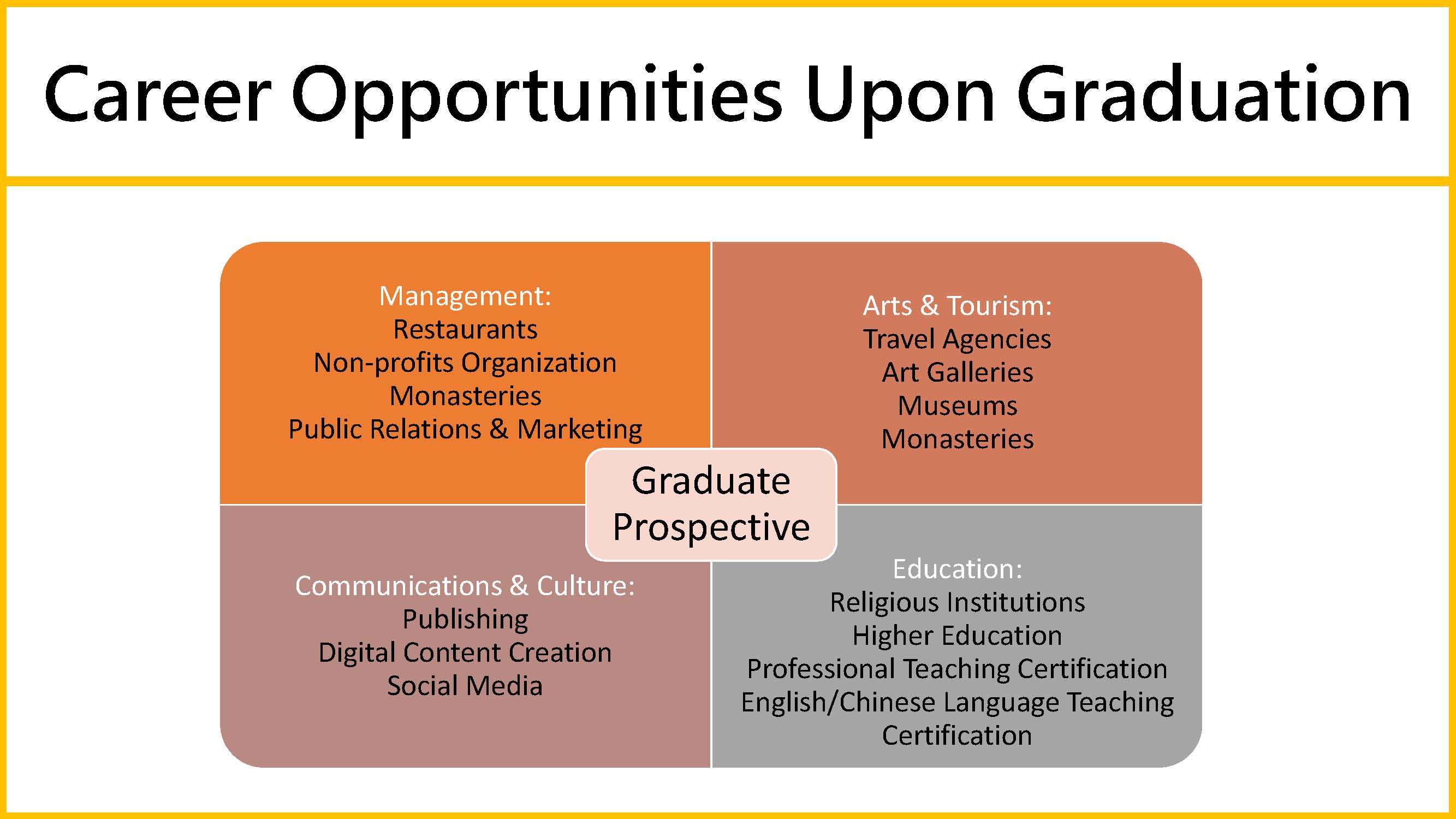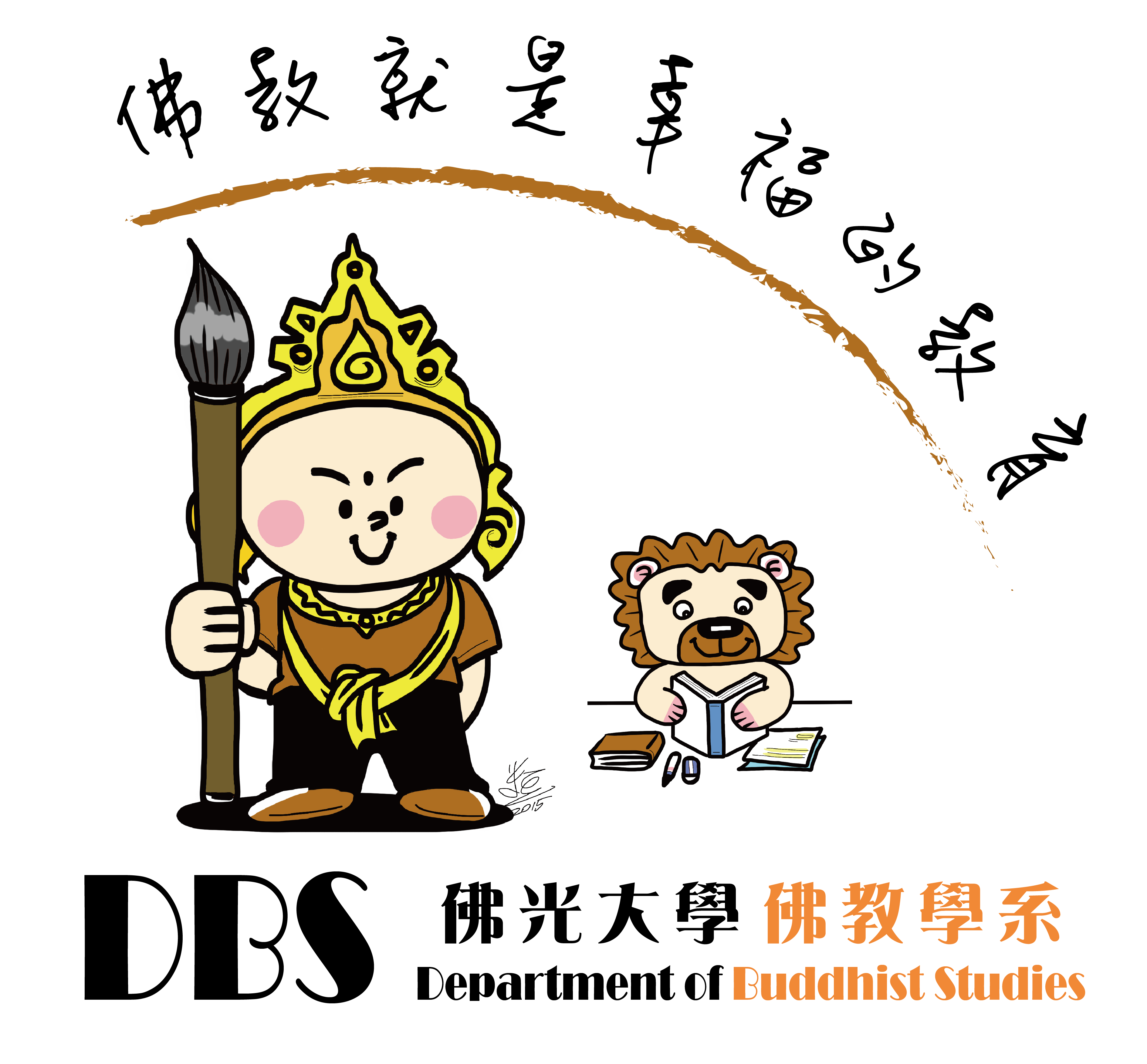Q&A
Department of Buddhist Studies -- Q&A
Use Ctrl+F to type keywords to search for questions you want to know.
If the question you want to know is not listed below, you can contact us through the following methods:
Tel.: (03) 9871000 ext. 27201~5.
E-mail: fgubuddhist@gmail.com
 Line ID: fgudbs
Line ID: fgudbs
Fan Page ![]() Facebook &
Facebook & ![]() Instagram:FGUDBS
Instagram:FGUDBS

Q1:What will I learn at DBS?
The department’s curriculum is rooted in the Dharma, with practice as its extension, aiming to build a comprehensive system of Buddhist knowledge.
In terms of academic programs, the department offers a Bachelor's program, a Master's program in Chinese, a Master's program in English, and a Doctoral program.
Please refer to our "Curriculum" page for detailed outlines of degree requirements, educational objectives, and career prospective.
Q2:At the Department of Buddhist Studies (DBS), can I explore fields beyond Buddhist Studies? What interdisciplinary options are available, and what are the benefits?
Absolutely! Our university is home to many other departments, offering a wide range of courses across both traditional and emerging disciplines. Students at DBS are encouraged to engage in interdisciplinary learning by combining Buddhist Studies with other fields of interest—for example, Buddhism and Psychology, Buddhism and Media Studies, or Buddhism and Management.
Interdisciplinary studies not only broaden academic perspectives but also enhance critical thinking, communication, and the ability to apply Buddhist insights in various professional and societal contexts.
Please refer to the "FGU Academic Manual" for further information about minor or secondary major degree requirements.
Q3:How do I apply to DBS? When are the deadlines?
There are four avenues of application, depending on your student status:
Local ROC students
International students
Overseas Chinese students
PRC students
Please consult our department's "Admissions" page for more details.
Q4:Can I enroll as a non-degree-program student and receive credit for my coursework?
Yes. Our department accepts applications for non-degree students at the undergraduate, Masters, and doctoral levels. Those interested can submit their applications to the "Office of Academic Affairs" during in the winter and summer interims prior to the start of the Autumn or Spring semesters. For more information, please refer to the "Office of Academic Affairs" page on "Non-degree Students". Non-degree students can request grade reports to prove satisfactory completion of coursework, which may be relevant to a future degree program.
Q5:Is there campus housing for students?
Students enrolled in a degree-program are eligible for dormitory housing; unfortunately, as rooms are limited, this privilege is not extended to non-degree students, who can instead commute or search for suitable rentals near campus.
Q6:Can I still apply for studies at DBS without any background in Buddhism?
We welcome applications from students of all backgrounds. Our undergraduate program is especially suitable for those without prior knowledge of Buddhist Studies, and students interested in pursuing a Master's degree may begin with undergraduate courses to build a solid foundation.
Doctoral-level coursework is more advanced and may be challenging for those without sufficient academic background; in such cases, the Master’s program is a more appropriate starting point.
As most students reside on campus during the semester, there are ample opportunities for learning and growth through peer interaction and discussion. Therefore, slight deficiencies in language or subject knowledge should not be a major concern.
Q7:Can I audit courses as a listener?
Unfortunately, we do not allow visitors from the general public to join our courses without official enrollment. Enrolled students can audit courses university-wide, contingent on permission of the course instructor. Each semester, select events, conferences, or talks may be open to registration from the general public.
Q8:Does DBS offer degree or diploma upon graduation?
Fo Guang University is a fully accredited general university, not a seminary. Unlike some Buddhist institutions in Taiwan that are not authorized to grant academic degrees, our programs are officially recognized by the Ministry of Education. Students who complete the requirements of their respective programs (B.A., M.A., or Ph.D.) will receive a nationally recognized academic degree upon graduation.
Q9:What are possible career prospectives for students upon graduation?

Q10:Who are the sponsors of the DBS departmental scholarships?
To support eligible students in pursuing their studies without financial stress, Venerable Master Hsing Yun established the Buddhist Studies Elite Scholarship, which provides NTD $50,000 per semester—covering nearly all essential expenses.
In addition, daily meals at the department are generously sponsored by the Fo Guang Shan Cultural and Educational Endowment, further ensuring that students can focus on their academic and spiritual development.
Q11:How do I apply for the departmental scholarship? What are the eligibility requirements?
All students who reside at the DBS College and follow the established guidelines for communal living and service are eligible to receive the departmental scholarship—regardless of academic performance. The scholarship may be awarded for up to four or eight semesters, depending on the duration of the student’s degree program.
For details, please refer to the “Scholarship Information” section on the department website.
Q12:Must I reside at the college as DBS student?
We encourage our students to reside on campus at the DBS College, as practicum courses are a vital part of our department’s educational vision. In addition to academic coursework, we aim to offer a framework for experiential learning—where intellectual understanding gradually deepens and transforms the heart and body.
Through established communal disciplines and responsibilities, students are given opportunities to cultivate character, gain practical experience, and develop wisdom—qualities that often cannot be conveyed through lectures alone.
Q13:What is “Practice” coursework?
Simply put, in addition to standard academic coursework offered by most departments and universities, our practicum courses introduce students to aspects of monastic communal life and discipline—including morning and evening chanting, meditation, and karma yoga (such as cooking, serving, and cleaning).
At DBS, we believe that communal discipline and teamwork are powerful tools for unlocking individual potential. Our aspiration is to nurture students into mature, responsible, and compassionate individuals—equipped not only with knowledge and skills, but also with the strength of heart to care for themselves, support others, and contribute meaningfully to society.
For more details, please visit the “Practice Courses” section on our departmental webpage.
Q14:What are “diǎnzuò” and “xíngtáng”?
These terms originating from the Chan/Zen tradition can be explained as:
“diǎnzuò” : cooking duties in the kitchen
“xíngtáng” : service duties in the dining hall at mealtimes
“záowǎnkè” : morning and evening liturgical chants, akin to lauds and vespers
Q15:Are there any age restrictions for enrollment at DBS?
None whatsoever. All interested are welcome to apply.
Q16:Must I be vegetarian at DBS?
Not at all. However, we kindly ask that you respect our DBS community by refraining from bringing non-vegetarian food into the Yunshui environment, including classrooms and residential areas. You are welcome to enjoy such food in all other buildings and areas on the Fo Guang University campus.
Q17:Must I be Buddhist to study at DBS?
Not at all. Those with any curiosity or interest (academic, historical, cultural, philosophical, etc.) in Buddhism, are welcome to apply.
Q18:Does DBS encourage students to ordain as monastics?
Certainly not. While our program includes practicum courses that introduce students to aspects of monastic life and tradition, Fo Guang University is an academic institution, not a seminary.
Ordination is a deeply personal decision that depends on many individual circumstances. We fully respect each student’s religious freedom and personal choices. Monastic ordination is not actively promoted within the department.
Q19: Do I need to have a good command of Mandarin Chinese to enroll in a program at DBS?
Yes and no. Our M.A. English-track program is conducted entirely in English, so Mandarin Chinese is not required.
However, our B.A., M.A. (Chinese-track), and Ph.D. programs are taught in Mandarin, and therefore a strong command of the Chinese language is essential.

 College and Department of Buddhist Studies, FGU
College and Department of Buddhist Studies, FGU